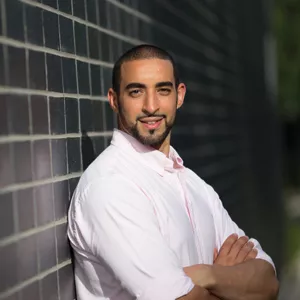
Alumnus, insect entrepreneur in Wall Street Journal, Fox Business News
Congratulations to UTM alumnus Mohammed Ashour--his company, Aspire, was featured on the front page of The Wall Street Journal, and appears later today on "Countdown to the Closing Bell with Liz Claman" on Fox Business News.
Here's the article on Ashour from the Spring 2016 issue of M--The University of Toronto Mississauga Magazine.
________________________________________
“If someone had come up to me a few years ago and said that one day, I’d be an insect farmer in Austin, Texas, I would have told them they were crazy,” says Mohammed Ashour, a 2009 U of T Mississauga graduate. He’s far from insane, although his career has veered away from youthful dreams of medical school. Rather, he’s been named to the Forbes Magazine annual “30 under 30” list for 2016.
Ashour, who earned an honours B.Sc. in life sciences, was accepted into the joint MBA/MD program at McGill University. During his MBA studies, Ashour and four classmates won the prestigious $1 million Hult Prize competition with their proposal for remedying global food insecurity with a microfarming project. The prize is awarded in partnership with the Clinton Global Initiative, headed by former U.S. president Bill Clinton.
The prize enabled the team to create the Aspire Food Group, a social entrepreneurship venture that helps microfarmers in Ghana cultivate palm weevil larvae—a popular food source—to provide both protein and income for their families. In the process of developing the project, Ashour decided that being a doctor wasn’t the only way to contribute to society’s needs; MBA in hand, he poured his energy into the startup instead.
“The idea is to empower independent farmers in Ghana to produce their own food and earn their own livelihood,” Ashour says. “We have more than 500 farmers working with us who farm in boxes in their own homes.”
Aspire provides the boxes and the farmers buy the necessary substrate and feed from the company at nominal cost. The farmers—largely women ages 55 and up—can feed their families and sell their “crop” at the local rural markets.
“Women of a certain age are treated like a social burden in the slums, but we’ve empowered these seniors to be the food providers of the family,” Ashour says.
The company has also pioneered industrial-scale insect farms in Texas to produce alternative protein sources for consumption, for restaurants and for production of power flour, a protein supplement. The flour provides an environmentally friendly way to supplement the North American reliance on animal protein, and the large-scale efforts helps fund the microfarmers.
Two years in, the company is still growing and exploring such possibilities as using its power flour in disaster relief.
“There’s a lot more we need to do,” Ashour says. “I think my perspective has changed significantly since I dreamed of going to medical school. I wanted a career that would impact lives in a material way while I earned a great living. I can now do that in a more amplified way. This is an extension of my dream, not a departure.”
